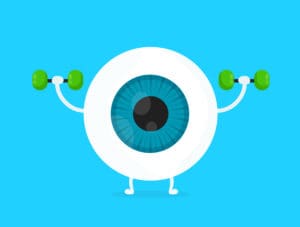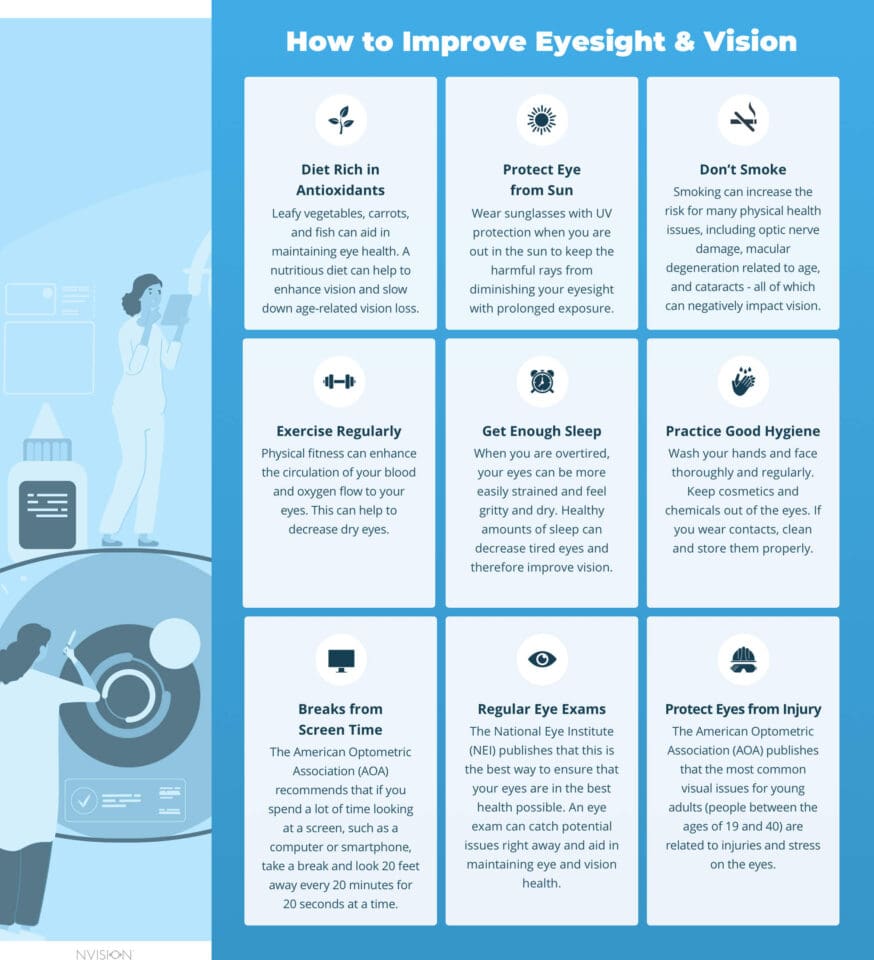How to Improve Your Eyesight Naturally (Facts & Myths)
Home /
Last Updated:
While there are limits to what you can do yourself to help your eyesight, adopting some overall wellness habits can still help.
As long as you avoid misinformation and make decisions based on scientific evidence, there are undeniably some lifestyle changes that can benefit your overall eye health.
Table of Contents

Can Your Vision Get Better?
You’ve probably wondered, “Can my vision improve over time?” In most cases, once adult vision has declined due to age, genetics, or eye conditions, it is unlikely to improve significantly without medical intervention like corrective lenses or surgery. However, a balanced lifestyle can help maintain your existing eyesight and might even slow the rate of further deterioration.
Certain health improvements—like better blood sugar control in diabetics—can lead to minor vision improvements. Regular eye check-ups can catch issues early, allowing for treatments that may slow down vision loss. Yet, substantial natural improvement in vision is rare for adults.
You deserve clear vision. We can help.
With 135+ locations and over 2.5 million procedures performed, our board-certified eye surgeons deliver results you can trust.
Your journey to better vision starts here.
So while achieving naturally better vision is unlikely, responsible eye care can help you maintain your current vision quality and could minimize future decline. Always consult your healthcare provider for personalized advice.
Realistic Expectations for Your Eyesight
If you hope to improve your eyesight, it is important to set realistic expectations. Be very careful visiting websites claiming to offer “secrets” to achieving good vision, especially if they purport that a particular product they sell is the way to achieve that improvement.
The difficulty with this reality is that it means unscrupulous individuals and organizations willing to mislead or outright lie can seem very attractive next to the truth. A website selling a $30 supplement promising to improve your eyesight seems like the better option to the uninformed compared to a medical professional telling them they need surgery or even have no way to realistically fix their vision.
This is why it’s so important to talk with a reputable medical professional if you want to improve your eyesight. Their opinion is informed and in your best interest, even if you might be disappointed by what they say.
While there is no magic fix to improve your eyesight naturally, certain habits can improve or worsen the overall health of your eyes. By adopting some healthy lifestyle changes, you can support your vision and eye health.
Dispelling Myths About Improving Eyesight Naturally
Can Eye Drops Dissolve Cataracts?
Many websites sell eye drops that claim to dissolve cataracts. There is no medically approved product that can do this, and you should avoid these products. The only currently accepted treatment for cataracts is surgery.
Research is currently being done on an experimental medicated eye drop formula that may have the potential to shrink cataracts in humans. Early animal experiments were promising, but there are a number of unknowns.
Importantly, even if this new treatment does work on humans, we are still not sure if it may have as of yet unknown side effects that could affect your eye health or other aspects of your health.
Do Carrots Improve Night Vision?
The idea that carrots, and food in general, might dramatically impact one’s vision has an unusual origin in that the myth comes from a WWII misinformation campaign. To help hide the fact that the British were using radar to detect German bombers, the British government issued false press statements claiming their pilots were being fed large portions of carrots to improve their night vision.
This misinformation campaign was largely successful and served an important military purpose at the time. Unfortunately, it also began a myth that has continued to this day.
Carrots and other foods can contain important nutrients for eye health, but eating them is unlikely to cause a dramatic change in your vision, especially if you already eat a healthy diet. While carrots can serve an important part in eye health (discussed more below), the change is more subtle than some believe.
Is Surgery Usually (or Never) Your Best Option?
In part because emotive “hot takes” can cause people to more easily believe misinformation, some people believe there is no value in discussing natural eyesight cures, thinking only surgery or similar measures are important when discussing eye health. Others may think surgery is never a good option, always seeking natural remedies and ignoring how scientifically reputable a given source actually is if it discusses appealing natural-sounding eye health treatments.
The scientific truth, as in many things, is actually in the middle of these extremes. A medical intervention like surgery is often the only way to treat an eye health problem.
If you believe you have an eye health issue, always see a doctor. However, diet and healthy behaviors can help your eye health too, especially in maintaining good eye health for longer.
The Role of Diet in Eye Health

A good, well-rounded diet is one of the best ways to maintain your eye health and get the nutrients you need. Some important nutrients and common sources of those nutrients include the following:
- Vitamin A (carrots, sweet potatoes, and cantaloupes)
- Vitamin C (oranges, peaches, and tomatoes)
- Vitamin E (avocadoes, almonds, and sunflower seeds)
- Omega-3 fatty acids (tuna, halibut, and chia seeds)
- Lutein and zeaxanthin (kale, spinach, and eggs)
- Zinc (kidney beans, lima beans, and oysters)
- Note: Zinc can reduce copper levels in your body, which is important for red blood cell production. You may want to talk to a doctor about the best way to increase your zinc intake without reducing your copper quantities to dangerous levels.
These nutrients are an important part of how the body keeps the eyes healthy.
The eye is an organ, and a relatively sensitive one, with arteries that send blood to key parts of it so nutrients and oxygen can get delivered to your cells. Healthy blood flow means your eye can better maintain itself. Likewise, poor blood flow, or a lack of the nutrients that blood is supposed to carry, can negatively impact your eye health.
You deserve clear vision. We can help.
With 135+ locations and over 2.5 million procedures performed, our board-certified eye surgeons deliver results you can trust.
Your journey to better vision starts here.
Can Supplements Help Your Eyesight Naturally?
Whether supplements can help a person’s eye health is somewhat debated. What further complicates the discussion is that many supplements are overpriced, with many of the top brands making broad claims about helping your vision health in ways not supported by science.
In most cases, experts seem to at least propose it is better to get one’s nutrients from diet. As a result, it is better to prioritize your overall diet than supplement intake.
One notable exception is the AREDS2 formula. This is a research-backed formula designed to help delay the progression of age-related macular degeneration (AMD), an eye health condition that naturally occurs as we age and certain elements of the eye break down.
It is worth researching the specifics of AREDS2 before beginning the formula. For example, the studies conducted suggest the formula is only effective for intermediate or late AMD, not for people who have not yet developed the condition.
What Behaviors Can Help Your Eyesight?
The CDC has provided some helpful guidelines for preventing vision loss:
- Get regular comprehensive eye exams from a medical professional.
- Research your family’s medical history, so you can understand your risk factors.
- Maintain a healthy weight, which helps to reduce your risk of developing a number of conditions that can affect your eye and overall health.
- Avoid smoking and other drugs that may affect your circulatory system.
- Wear sunglasses when going outside to guard against the sun’s UV rays.
- Practice good hygiene, washing your hands and caring for your contact lenses based on expert recommendations.
- Always practice good eye safety, especially in industrial and similar workplaces.
- For diabetics, maintain your blood sugar levels. This is also important for non-diabetics, but the body generally does this naturally.
These habits vary on the reasoning behind their recommendations. Some are to help catch eye health conditions early, allowing a doctor to diagnose and treat them as soon as possible. Some are to improve blood circulation, making sure your eyes get the oxygen and nutrients they need. A few are to protect your eyes from contamination or foreign bodies.
By practicing them all and remaining mindful of your eye health, you can greatly reduce your risk of vision loss.
Eyesight & Maintenance
Generally speaking, the above tips to achieve good eyesight naturally are going to help maintain your eyesight rather than improve it.
Many of the conditions that might cause a person’s visual acuity to drop below the 20/20 standard require either corrective eyewear or surgery to fix. Even then, it is not always possible to achieve the perfect 20/20 standard.
In some cases, such as with age-related macular degeneration, the best a person can do is slow the progression of their condition and talk to their doctor about tips to improve their quality of life as their vision declines.

You deserve clear vision. We can help.
With 135+ locations and over 2.5 million procedures performed, our board-certified eye surgeons deliver results you can trust.
Your journey to better vision starts here.
References
- 36 Fabulous Foods to Boost Eye Health. (January 2020). American Academy of Ophthalmology.
- AREDS/AREDS2 Frequently Asked Questions. (November 2020). National Eye Institute.
- Dietary Supplements for Eye Conditions. (March 2022). National Center for Complementary and Integrative Health.
- Dissolving Cataracts With Eye Drops Instead of Surgery? (August 2015). American Academy of Ophthalmology.
- Do Carrots Really Help You See in the Dark? Science Focus.
- Ocular Nutritional Supplements. (March 2015). American Academy of Ophthalmology.
- The Psychological Drivers of Misinformation Belief and Its Resistance to Correction. (January 2022). Nature Reviews Psychology.
- Nutrients for the Aging Eye. (June 2013). Clinical Interventions in Aging.
- Nutrients for Prevention of Macular Degeneration and Eye-Related Diseases. (April 2019). Antioxidants.
This content is for informational purposes only. It may have been reviewed by a licensed physician, but is not intended to serve as a substitute for professional medical advice. Always consult your healthcare provider with any health concerns. For more, read our Privacy Policy and Editorial Policy.
